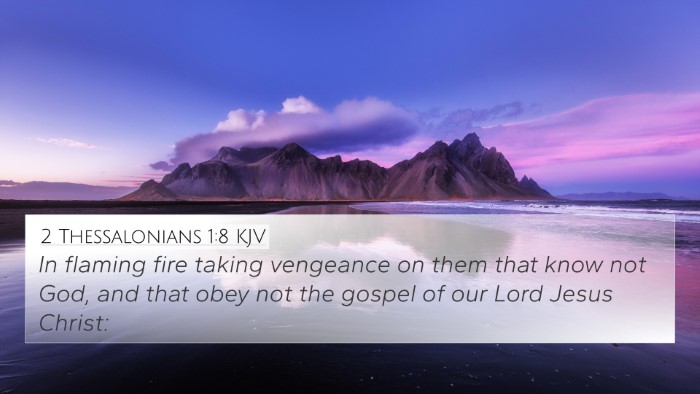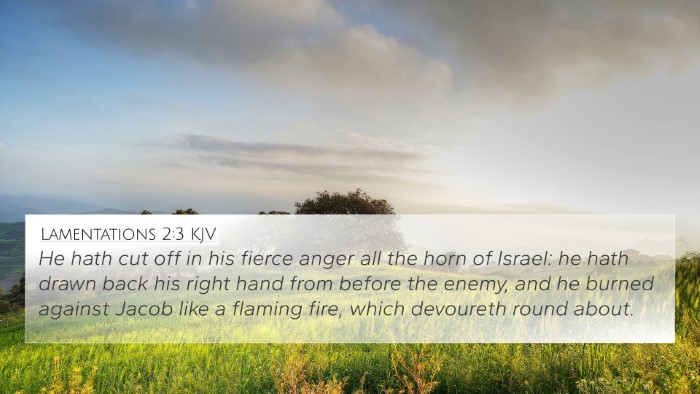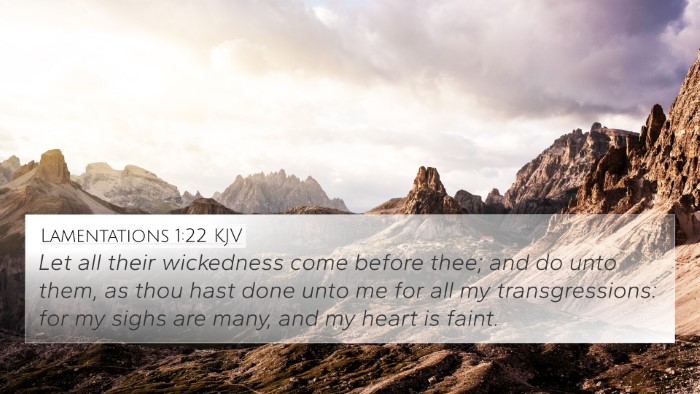Lamentations 1:13 - Meaning and Interpretation
Lamentations 1:13 states, "From above hath he sent fire into my bones, and it prevaileth against them: he hath spread a net for my feet; he hath turned me back: he hath made me desolate and faint all the day." This verse weaves a profound picture of suffering and divine judgment, offering deep emotional insight into the plight of Jerusalem after its destruction.
Summary of the Verse
The verse expresses the deep anguish of the poet (traditionally understood to be Jeremiah) who laments the intense suffering of the nation. The imagery of fire symbolizes a fierce, consuming pain that is unmistakably divine in origin. The net represents the traps and barriers placed by God, emphasizing a feeling of entrapment and helplessness.
Commentary Insights
Drawing from the insights of various public domain commentaries, we can summarize the meaning of Lamentations 1:13 as follows:
- Matthew Henry: Henry emphasizes the personal nature of the suffering, noting that the poet feels overwhelmed by God’s wrath. The fire is a metaphor for both physical and spiritual distress, showcasing the depth of the desolation experienced.
- Albert Barnes: Barnes explains the figurative language, noting that the fire signifies God’s judgment that burns within the bones of the afflicted. The spreading net depicts the inescapable consequences of sin, showing how God holds the nation accountable.
- Adam Clarke: Clarke identifies the significance of desolation in the verse, highlighting that it serves as a result of the nation's failure to repent. He interprets the fire as a purging force, positioning suffering as both punishment and a call to return to God.
Theological Implications
The verse has important theological implications regarding God's discipline and the consequences of transgression. It illustrates how God's actions, while painful, are ultimately aimed at bringing humanity closer to repentance and restoration.
Cross-References
This verse can be connected with multiple other scriptures that elucidate similar themes of suffering, judgment, and divine discipline. Some notable cross-references include:
- Hebrews 12:6: "For whom the Lord loveth he chasteneth, and scourgeth every son whom he receiveth."
- Psalm 38:3: "There is no soundness in my flesh because of thy anger; neither is there any rest in my bones because of my sin."
- Jeremiah 5:14: "Wherefore thus saith the Lord God of hosts, Because ye speak this word, behold, I will make my words in thy mouth fire, and this people wood, and it shall devour them."
- Isaiah 59:2: "But your iniquities have separated between you and your God, and your sins have hid his face from you, that he will not hear."
- Job 30:30: "My skin is black upon me, and my bones are burned with heat."
- Lamentations 3:1-2: "I am the man that hath seen affliction by the rod of his wrath. He hath led me, and brought me into darkness, but not into light."
- Ezekiel 18:30: "Therefore I will judge you, O house of Israel, every one according to his ways, saith the Lord God. Repent, and turn yourselves from all your offenses; so iniquity shall not be your ruin."
Connecting Biblical Themes
The connections between Lamentations 1:13 and other biblical verses reveal a thematic continuity regarding suffering as a consequence of sin and the need for divine discipline. This idea resonates deeply throughout the Old Testament, as seen in the prophetic literature, and continues into the New Testament with teachings on repentance and accountability.
Practical Application
For individuals studying the Bible or preparing for sermons, understanding the implications of suffering and divine correction from verses like Lamentations 1:13 can enrich one's theological perspective. Engaging with cross-references provides a comprehensive view of God's nature and our human conditions.
Conclusion
Lamentations 1:13 offers a profound reflection on grief, divine judgment, and the human condition. By examining this verse in the context of its cross-references, we gain a holistic understanding of the broader biblical narrative regarding God's relationship with His people, emphasizing the need for repentance and restoration.


























